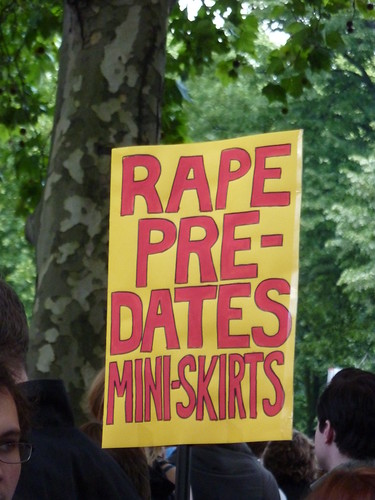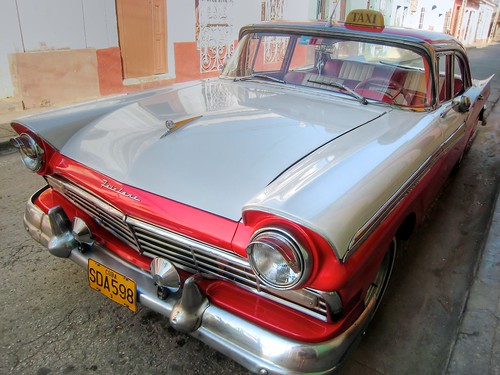Last night I was in an exhausting Facebook debate about rape. It started out when a friend of mine posted an illustrated quote from Julie Borowski's speech on how to avoid rape. In it, she counters advice that women who are being assaulted should pee their pants to dissuade their would-be rapists. Her advice: "Don't pee your pants if you're about to be raped. Whip out [a gun] and make your wannabe rapist pee his pants instead." My friend had paired this quote with a picture of wet jeans and it was then shared multiple times by his friends.
I messaged him to tell him that I was disappointed that he was helping to promote messages that women need to prevent rape instead of focusing on teaching would-be rapists not to rape. There are plenty of discussions on why placing the responsibility of avoiding rape on the shoulders of victims is a problem. In short, women have already heard for years and years about how "careful" we need to be. We can't walk alone after dark, wear our hair in ponytails, take our eyes off our drinks, go into big parking lots, travel unarmed, or put on a short skirt or a tight top without being told that our actions are "asking for it."

Over the course of this discussion, we got off on many tangents, but one of them came up when my friend made two separate analogies defending his position. At one point, another person was arguing on the thread and said that she believed rape was as bad as (or even worse than) murder. The friend I was arguing with took issue with this and said that nothing was worse than being dead. To help drive home his point he said that he'd rather have his car keyed than stolen.
At another point in the conversation, he compared women taking defensive measures against rape (including carrying a firearm) to "defensive driving," and said that it was a (smart) option, but not a requirement.

I maintained that his analogies were inadequate because a human being is not a car. Protecting yourself against assault is not the same as protecting your house against burglary or your car against theft. I am not property. I am not a car.
This ended up in a winding discussion of whether a person is property. He maintained that he is his own property, that he "owns" himself. I maintained that no one can own me, not even me. I am not a possession, and I cannot "own" myself because without my whole being, there is nothing to take ownership. I can have ownership over my actions or my possessions, but I am not a possession myself.
This is the point that I want to focus on. Can a person "own" him/herself? Do you "own" yourself?
I found an interesting post on this topic. This author points out that "self ownership" is a particularly Libertarian idea, and I was arguing with self-identified Libertarians, so I suppose that was the tension I was coming up against. He goes on to explain that the legal definition of ownership has to involve a possession and--even then--is not representative of complete control. I own my house, but if I set it on fire, I commit a crime and under some circumstances, it can be seized from me. He concludes that:
“Ownership” is a social/legal construct, and the fact is, at least where I live (in the U.S. of A.), “ownership” is simply NOT something that is explicit applied to human beings in any official capacity. To my knowledge, the government has made no determination as to whether we own ourselves, or whether we are owned by the government. Thus, it’s meaningless to apply the concept of “ownership” to human beings. It doesn’t mean anything to say that we own ourselves, nor does it mean anything to say that we are owned by someone else. The facts of reality are the facts of reality, and in this case, we control some aspects of our own lives, and likewise, the government controls some aspects of our lives. Who exactly “owns” us, is not a meaningful question.
I don't know that I agree that it's not a meaningful question at all, but I do agree that it's not legally a meaningful question. You cannot own a person. We've settled that. There have been times when human beings were seen as property in America, and the concept was vile enough to spark a Civil War to bring about the end of slavery.
The legal definition of "personal property" clearly does not apply to yourself, but I still think it's worthwhile to question this concept from a philosophical standpoint. The thought behind those belief systems seem largely aligned in Libertarian principles as well, with one of the cited proponents explaining "each person enjoys, over himself and his powers, full and exclusive rights of control and use, and therefore owes no service or product to anyone else that he has not contracted to supply."
Again, from a legal standpoint this is clearly not true. There are laws governing whether or not we can sell our organs or even just walk around topless. Suicide has often been criminalized. We are required to pay taxes. Legally, we clearly do not own ourselves even in this philosophical way.
So I guess the question is then is it even possible to own ourselves? If all of the laws were set aside, could we claim ownership over our selves?
I still argue no.
In order to take possession of something, I have to have an embodied entity to take control of that possession. Since I cannot separate my self from my self, there is no self to take ownership of the self. I know that was a confusing sentence, but I think that's because this is an impossible concept. There is no self I can separate out without losing myself, and if I am no longer a self, then I cannot possess anything. Creating a possession to take hold of would necessarily eliminate my ability to take possession of it. Self-ownership is a philosophical impossibility.
I think it's a good thing that it's an impossibility because I think the implications of viewing a human being as a possession (even if only of one's self) are highly problematic. If I am a possession, then perhaps arguments that it is my responsibility to protect myself from a would-be assailant make some sense, but that mindset would also explain why we're putting so much energy into preaching "protection" rather than respect. If we see human beings as possessions, it is a lot harder to get across the message of respect of humanity for humanity's sake. In addition, the message of "protection" is clearly not working when it comes to rape and sexual assault, and perhaps this philosophical foundation has something to do with why it is failing.
What do you think? Can you "own" yourself?
Photo: cathredfern, @Doug88888


in this context, owning a person feels a bit to me like saying a corporation is a person. These kinds of equations occur when we try to reduce the needs of complex human society to the simplicities of a marketplace. really aggravating - and if taken too far, frightening.
ReplyDeleteGreat point! I think that "corporations are people, too" line of thinking makes my skin crawl for the exact same reason. It's a commodification of humanity that spins off into all sorts of social problems.
ReplyDelete